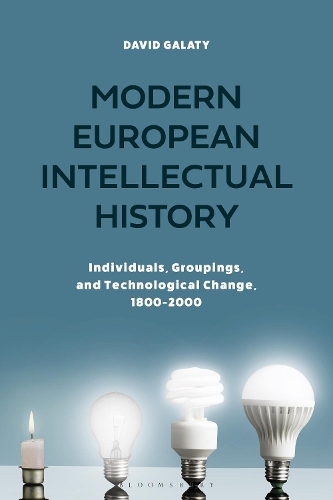
Modern European Intellectual History: Individuals, Groupings, and Technological Change, 1800-2000
(Hardback)
Available Formats
Publishing Details
Modern European Intellectual History: Individuals, Groupings, and Technological Change, 1800-2000
By (Author) Professor Emeritus David Galaty
Bloomsbury Publishing PLC
Bloomsbury Academic
2nd June 2022
United Kingdom
Classifications
Tertiary Education
Non Fiction
History of ideas
940.28
Physical Properties
Hardback
432
Width 156mm, Height 234mm
785g
Description
This non-technical introduction to modern European intellectual history traces the evolution of ideas in Europe from the turn of the 19th century to the modern day. Placing particular emphasis on the huge technological and scientific change that has taken place over the last two centuries, David Galaty shows how intellectual life has been driven by the conditions and problems posed by this world of technology. In everything from theories of beauty to studies in metaphysics, the technologically-based modern world has stimulated a host of competing theories and intellectual systems, often built around the opposing notions of the power of the individual versus collectivist ideals like community, nation, tradition and transcendent experience. In an accessible, jargon-free style, Modern European Intellectual History unpicks these debates and historically analyses how thought has developed in Europe since the time of the French Revolution. Among other topics, the book explores: * The Kantian Revolution * Feminism and the Suffrage Movement * Socialism and Marxism * Nationalism * Structuralism * Quantum theory * Developments in the Arts * Postmodernism * Big Data and the Cyber Century Highly illustrated with 80 images and 10 tables, and further supported by an online Instructor's Guidet, this is the most important student resource on modern European intellectual history available today.
Reviews
This book is a map or a story, but more importantly an introduction to the possibility of remaking the ideas that shape us through a study of their history. Seated in Europe but examining the past two hundred years in order to understand how ideas have been materialised and then helped change thought anew in unexpected ways, it begins simply with well-told stories and vignettes. Yet always aware of oppositions, especially between individualisms and collectivisms, and shifting between political, economic and philosophical thought as well as science, technology, literature, poetry and art, the book gradually builds up the kind of rich and subtle understanding that provides wisdom. David Galaty achieves this by exploring different voices and tracking the tensions of imperialism, gender and racialised visions, as well as the revolutionary ideals of liberty, equality and fraternity. We need both the play of counterpoints and the unusually searching and comprehensive perspective that Galaty offers, and it is an unexpected pleasure to find this conveyed in such clear prose. As the book unfolds and diverse perspectives layer into one another, you will find yourself admiring the work of someone who thinks carefully on an unusually broad scale. * Richard Staley, Hans Rausing Lecturer and Reader in History and Philosophy of Science, University of Cambridge, UK *
This book is a salon rather than a lecture, in which ideas are explained, but also overheard, adapted and sometimes misunderstood. It traces its subjects chronologically, but moves like the flying shuttle invented in the industrial revolution, laterally across the fabric of history, as well down through conventional historical chronology. * Ben Westervelt, Associate Professor of History, Lewis & Clark College, USA *
Author Bio
David Galaty is Professor Emeritus at the University of Wisconsin-Green Bay, USA and Assistant Professor with Term at Lewis and Clark College, USA. He is the author of Wider than the Sky (1998) and co-editor of Discovering Criminology (1993) and Revolutions in Art and Ideas at the Turn of the Twentieth Century (1994).
